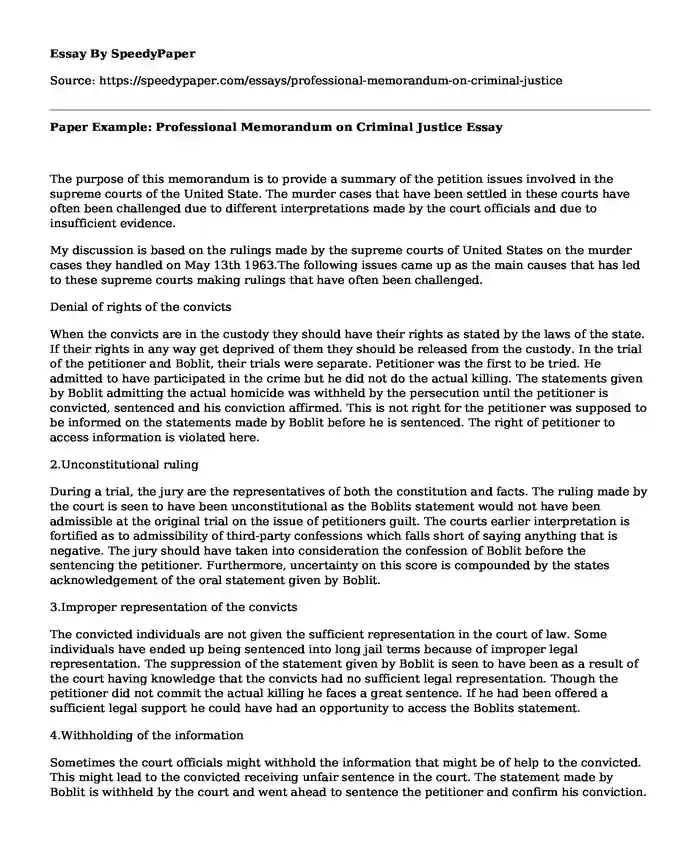
| Type of paper: | Essay |
| Categories: | Court system Criminal justice |
| Pages: | 3 |
| Wordcount: | 583 words |
The purpose of this memorandum is to provide a summary of the petition issues involved in the supreme courts of the United State. The murder cases that have been settled in these courts have often been challenged due to different interpretations made by the court officials and due to insufficient evidence.
My discussion is based on the rulings made by the supreme courts of United States on the murder cases they handled on May 13th 1963.The following issues came up as the main causes that has led to these supreme courts making rulings that have often been challenged.
Denial of rights of the convicts
When the convicts are in the custody they should have their rights as stated by the laws of the state. If their rights in any way get deprived of them they should be released from the custody. In the trial of the petitioner and Boblit, their trials were separate. Petitioner was the first to be tried. He admitted to have participated in the crime but he did not do the actual killing. The statements given by Boblit admitting the actual homicide was withheld by the persecution until the petitioner is convicted, sentenced and his conviction affirmed. This is not right for the petitioner was supposed to be informed on the statements made by Boblit before he is sentenced. The right of petitioner to access information is violated here.
2.Unconstitutional ruling
During a trial, the jury are the representatives of both the constitution and facts. The ruling made by the court is seen to have been unconstitutional as the Boblits statement would not have been admissible at the original trial on the issue of petitioners guilt. The courts earlier interpretation is fortified as to admissibility of third-party confessions which falls short of saying anything that is negative. The jury should have taken into consideration the confession of Boblit before the sentencing the petitioner. Furthermore, uncertainty on this score is compounded by the states acknowledgement of the oral statement given by Boblit.
3.Improper representation of the convicts
The convicted individuals are not given the sufficient representation in the court of law. Some individuals have ended up being sentenced into long jail terms because of improper legal representation. The suppression of the statement given by Boblit is seen to have been as a result of the court having knowledge that the convicts had no sufficient legal representation. Though the petitioner did not commit the actual killing he faces a great sentence. If he had been offered a sufficient legal support he could have had an opportunity to access the Boblits statement.
4.Withholding of the information
Sometimes the court officials might withhold the information that might be of help to the convicted. This might lead to the convicted receiving unfair sentence in the court. The statement made by Boblit is withheld by the court and went ahead to sentence the petitioner and confirm his conviction. The petitioner is given unfair sentence.
In conclusion, many convicts have suffered improper court rulings not because they deserve but because the system they undergo is unfair. The courts officials have caused the system to be malpractice. These practices can cause the officials of the court to be sued for violating the rights of the convicts. Withholding someones information is a violation as it prevents the convicted to access the information that might be of help to them. Insufficient legal advice and support might lead to one facing inappropriate sentence.
References
UNITED STATES v. ARGUR, (1976) No.75-491
Brady v. Mryland 373 U.S 83 (1963)
Cite this page
Paper Example: Professional Memorandum on Criminal Justice. (2019, Aug 28). Retrieved from https://speedypaper.com/essays/professional-memorandum-on-criminal-justice
Request Removal
If you are the original author of this essay and no longer wish to have it published on the SpeedyPaper website, please click below to request its removal:
- Finance Essay Example: NJ Budget Process
- Plants for Food - Free Essay from Our Database
- Free Essay with a Professional Psychosocial Report
- Essay Example on Organizational Transformation Through Domain Architecture
- Business Essay Sample: Food Truck in Hong Kong
- President Andrew Jackson and the Removal of Indians
- Essay Example on Dulles' Theology of Revelation
Popular categories




